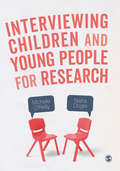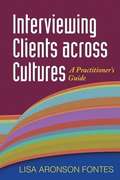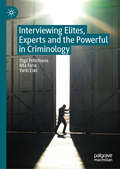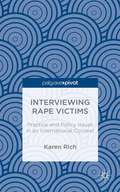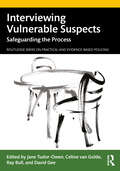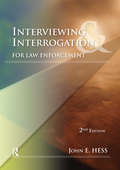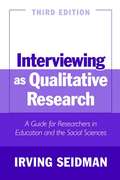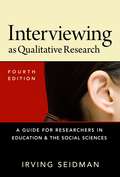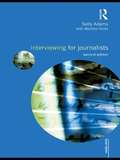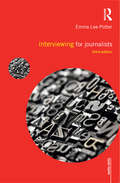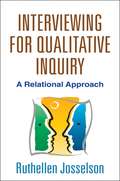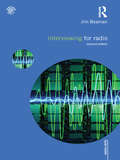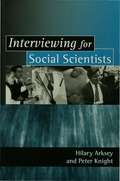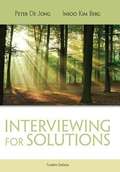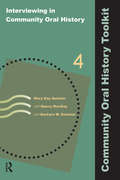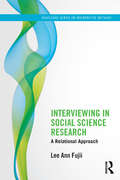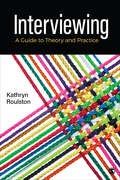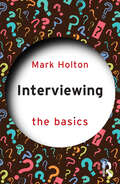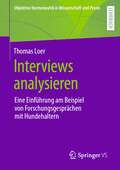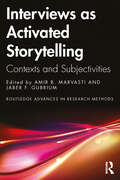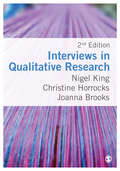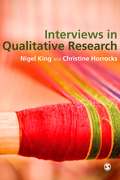- Table View
- List View
Interviewing Children and Young People for Research
by Dr Michelle O'Reilly Professor Nisha DograThis book provides a practical, pedagogical perspective on conducting qualitative interviews with children and young people. From designing and choosing the type of interview through to planning, structuring, conducting, and analysing them this book is a complete toolkit. Drawing upon real-world examples and researchers' anecdotes, the authors combine both theoretical background and practical advice to introduce common issues and procedures and to help you undertake your own interviews in the field. Key topics include how to: Choose which interview style meets your and your participants’ needs Maintain a safe and ethically sound research environment Incorporate participatory methods into formal interview settings Encourage participation and capture the voice of interviewees Utilise digital tools, software and methods to collect and analyse data This clear, articulate book is an essential companion for anyone interviewing children and young people.
Interviewing Clients across Cultures
by Lisa Fontes Sandra Graham-BermannPacked with practical pointers and examples, this indispensable, straight-talking guide helps professionals conduct productive interviews while building strong working relationships with culturally and linguistically diverse clients. Chapters cover verbal and nonverbal ways to build rapport and convey respect; how to overcome language barriers, including effective use of interpreters; culturally competent interviews with children and adolescents; and key issues in working with immigrants and refugees. Strategies for avoiding common cross-cultural misunderstandings and producing fair, accurate reports are presented. Every chapter concludes with thought-provoking discussion questions and resources for further reading.
Interviewing Elites, Experts and the Powerful in Criminology
by Olga Petintseva Rita Faria Yarin EskiThis book offers practical advice on designing, conducting and analyzing interviews with ‘elite’ and ‘expert’ persons (or ‘socially prominent actors’), with a focus on criminology and criminal justice. It offers dilemmas and examples of ‘good’ and ‘bad’ practices in order to encourage readers to critically asses their own work. It also addresses methodological issues which include: access, power imbalances, getting past ‘corporate answers’, considerations of whether or not it is at times acceptable to ask leading questions and whether to enter a discussion with a respondent at all. This book will be valuable to students and scholars conducting qualitative research.
Interviewing For The Helping Professions: A Comprehensive Relational Approach
by Nicole Nicotera Fred McKenzieA successful professional interview depends on the development of a generally positive human interaction. Without a positive base, the interview can be fraught with difficulties and roadblocks. This is true regardless of the discipline, be it social work, psychology, human services, nursing, criminal justice, medicine, psychiatry, or any other field. Beginning interviewers may have learned solid technique, but often are initially focused more on thinking about what they will say next than on understanding or even listening to the client. As a result, that critical initial interview -- whose success affects the future of most professional encounters -- is often disrupted by a failure to truly listen and understand, which is the foundation for earning clients' trust. This second edition goes beyond most other clinical interviewing books in its emphasis on the emotional foundation of interviewing and its focus on the importance of social justice and attention to the problem of microaggressions that can prohibit building and maintaining therapeutic rapport with clients. Interviewing for the Helping Professions can help both the beginning professional and the veteran interviewer understand the nature and purpose, technique, meaning, emotions, and outcomes of the interviewing process. The book also provides a comprehensive overview of the theory and technique so crucial to meaningful interviewing. More important, it emphasizes the emotional significance of the interaction and grounds the interviewing process in contemporary theories of practice and social justice.
Interviewing Rape Victims: Practice and Policy Issues in an International Context
by Karen RichThis study presents a unique overview of the cultural, social and practical aspects of interviewing rape victims. Exploring a range of issues that affect rape cases including discourse, gender, attitudes and victim's rights, Rich reveals the complexities of sexual assault and looks to how communities can work to respond to and combat such violence.
Interviewing Vulnerable Suspects: Safeguarding the Process (Routledge Series on Practical and Evidence-Based Policing)
by Jane Tudor-Owen, Celine van Golde, Ray Bull, and David GeeThis book is an in-depth, evidence-based guide to interviewing suspects with specific vulnerabilities. It provides an overview of current research, practices, and legal considerations for interviewing vulnerable suspects, incorporating guidelines regarding the identification of vulnerabilities, engaging with third parties in the interview, and training and supervision. It then goes on to cover specific vulnerabilities typically encountered in suspect populations, providing clear summaries of current research, case studies, and practical guidance for conducting interviews with these populations to facilitate best practice in interviewing. Expertise is drawn from both law enforcement practice and academic research to ensure an evidence-based approach that is relevant for contemporary practice. Interviewing Vulnerable Suspects offers the international policing audience a practical guide to interviewing vulnerable suspects for both uniform police and detectives. It is relevant for statutory bodies involved in investigations of misconduct; legal practitioners and forensic psychologists; practitioners in counselling, social work, and psychology; and students in policing, criminology, and forensic psychology programs.
Interviewing and Interrogation for Law Enforcement
by John E. HessEasy-to-read and practical, this text uses a survey approach and numerous examples to illustrate interviewing skills and techniques. Using his years of experience as an instructor at the FBI Academy, the author dispels some of the mystery surrounding the interview process by sharing techniques and ideas that have been used successfully. The author has years of experience as an FBI academy instructor.
Interviewing as Qualitative Research: A Guide for Researchers in Education and the Social Sciences (3rd edition)
by Irving SeidmanThe third edition of this bestselling resource provides clear, step-by-step guidance for new and experienced interviewers to help them develop, shape, and reflect on interviewing as a qualitative research process.
Interviewing as Qualitative Research: A Guide for Researchers in Education and the Social Sciences 4th Ed
by Irving SeidmanNow in its fourth edition, this popular book provides clear, step-by-step guidance for new and experienced interviewers to develop, shape, and reflect on interviewing as a qualitative research process. Using concrete examples of interviewing techniques to illustrate the issues under discussion, this classic text helps readers to understand the complexities of interviewing and its connections to broader issues of qualitative research. The text includes principles and methods that can be adapted to a range of interviewing approaches.
Interviewing for Journalists
by Adams SallyInterviewing for Journalists details the central journalistic skill of how to ask the right question in the right way. It is a practical and concise guide for all print and online journalists - professionals, students and trainees - whether writing news stories or features for newspapers and magazines, print and web. Interviewing for Journalists focuses on the many types of interviewing, from the routine street interview, vox pop and press conference to the interview used as the basis of an in-depth profile. Drawing on previously published material and featuring interviews with successful columnists such as Emma Brockes, who writes for the Guardian and the New York Times and Andrew Duncan of Radio Times. Interviewing for Journalists covers every stage of interviews including research, planning and preparation, structuring questions, the importance of body language, how to get a vivid quote, checking material and editing it into different formats. Interviewing for Journalists includes: a discussion about the significance and importance of the interview for journalism advice on how to handle face-to-face interviewees with politicians, celebrities and vulnerable people advice on dealing with PRs how to carry out the telephone and online interview tips on note-taking and recording methods including shorthand a discussion of ethical, legal and professional issues such as libel, doorstepping, off-the-record briefings and the limits of editing a glossary of journalistic terms and notes on further reading.
Interviewing for Journalists
by Emma Lee-PotterInterviewing for Journalists focuses on the central journalistic skill of how to ask the right questions in the right way. It is a practical and concise guide for all print and online journalists – professionals, students and trainees – who write news stories and features for newspapers, magazines and online publications. In the age of digital journalism, where computer-based research is easily available, this new edition seeks to emphasise the value of getting out there, engaging with people directly and building relationships to create original and meaningful media content. Interviewing for Journalists highlights the many different approaches to interviewing, from vox pops and press conferences to news interviews and in-depth profiles. This third edition features brand new interviews with some of the most successful journalists in the industry, including Camilla Long of The Sunday Times, Heidi Blake of BuzzFeed UK, Brian Viner of the Daily Mail and award-winning freelance writers Cole Moreton and Stephanie Rafanelli. It covers every stage of interviewing, such as research, fixing interviews, structuring questions, body language, how to get vivid quotes and how to handle challenging interviews. The third edition of Interviewing for Journalists includes: advice on how to carry out face-to-face, telephone and online interviews; tips on taking notes, shorthand and recording interviews; guidance on dealing with different interviewees, such as celebrities, politicians and vulnerable people; interviewing tasks to put your journalistic skills into practice; a discussion of ethical and legal issues by Professor Tim Crook of Goldsmiths, University of London.
Interviewing for Qualitative Inquiry: A Relational Approach
by Ruthellen JosselsonEngagingly written, this book builds the reader's skills for conducting in-depth interviews designed to address a particular research question. With an emphasis on the dynamics of the research relationship, Ruthellen Josselson artfully demonstrates the steps of a successful interview. Each step is illustrated with excerpts from interviews on diverse topics. The book describes how to structure interviews effectively, develop questions that elicit meaningful narratives, cultivate skills for empathic listening and responding, avoid common pitfalls, and deal with problems that develop in an interview.Pedagogical features include:*Practice exercises adapted from Josselson's popular workshops.*Annotated examples of "good" and "bad" interviews.*A chapter on interviewing dos and don'ts.*Appendices with interview aids, sample follow-up questions, and a sample consent form.
Interviewing for Radio (Media Skills)
by Jim Beaman'Jim Beaman’s Interviewing for Radio is a classic and seminal practice text, brilliantly written and masterful in its content. Nobody working in professional radio can do without it. It is a must for all radio courses and I could not recommend it more highly' - Tim Crook, Head of Radio, Goldsmiths College, University of London, UK Interviewing for Radio is a thorough introduction to the techniques and skills of the radio interview. It offers advice on how to ask the right question and elicit a response, and guides the reader through the use of equipment, the mechanics of recording, the studio environment, live broadcasts, presentation and pronunciation, and editing material. Written by an experienced producer and instructor, Interviewing for Radio includes: the history of the radio interview and the importance of its role today practical exercises which introduce successful interview and technical skills case studies and hypothetical scenarios to help you prepare for potential difficulties a discussion of ethics, risk assessment, codes of conduct and regulations This second edition has been thoroughly updated and includes advice from a new range of practitioners, and examples of recent UK and international interviews. The author critically analyses these interviews and explains the preparation, organisation and expertise required in order to produce a successful radio broadcast. Interviewing for Radio references both new and existing regulations and guidelines for UK journalists, then offers a global perspective by drawing on the differences and similarities with those applicable to other countries. This invaluable book is supported by a companion website that includes audio interviews with practitioners accompanied by a range of student exercises, a comprehensive glossary in the form of interactive flashcards, and suggested links for further listening.
Interviewing for Social Scientists: An Introductory Resource with Examples
by Peter Knight Hilary ArkseyThis is an excellent book. It will be required reading on my methods courses' - "Nigel Fielding, University of Surrey " This book is comprehensive, easy to read, fascinating and a must for every college library where students study research methods for short reports or longer theses' -" Educational Review "Students at postgraduate, and increasingly at undergraduate, level are required to undertake research projects and interviewing is the most frequently used research method. This book provides a comprehensive and authoritative introduction to interviewing. It covers all the issues that arise in interview work: theories of interviewing; design; application; and interpretation. Richly illustrated with relevant examples, each chapter includes handy statements of advantages' and disadvantages' of the approaches discussed.
Interviewing for Solutions (Fourth Edition)
by Peter De Jong Insoo Kim BergWritten in a clear, informative, and informal style, INTERVIEWING FOR SOLUTIONS features a unique solutions-oriented approach to basic interviewing in the helping professions. Peter DeJong and Insoo Kim Berg's proven approach views clients as competent, helps them to visualize the changes they want, and builds on what they are already doing that works. Throughout the book, the authors present models for solution-focused work, illustrated by examples and supported by research.
Interviewing in Community Oral History (Community Oral History Toolkit #4)
by Nancy MacKay Barbara W Sommer Mary Kay QuinlanThe interview is the anchor of an oral history project. The fourth book in the five-volume Community Oral History Toolkit guides the interviewer through all the steps from interview preparation through follow-up. It includes guidance on selecting interviewees, training interviewers, using recording equipment, and ethical issues concerning the interviewer-interviewee relationship. Packed with instructive case studies, Volume 4 offers concrete practical examples and advice for issues such as pre-interview research, developing interview questions and points for guiding discussion, ideal interview settings and conditions, strategies for stimulating interviewees’ memories, acceptable communication techniques and behavior throughout the interview process, and rounding out interview documentation with supplementary materials and contextual information.
Interviewing in Social Science Research: A Relational Approach (Routledge Series on Interpretive Methods)
by Lee Ann FujiiWhat is interviewing and when is this method useful? What does it mean to select rather than sample interviewees? Once the researcher has found people to interview, how does she build a working relationship with her interviewees? What should the dynamics of talking and listening in interviews be? How do researchers begin to analyze the narrative data generated through interviews? Lee Ann Fujii explores the answers to these inquiries in Interviewing in Social Science Research, the latest entry in the Routledge Series on Interpretive Methods. This short, highly readable book explores an interpretive approach to interviewing for purposes of social science research. Using an interpretive methodology, the book examines interviewing as a relational enterprise. As a relational undertaking, interviewing is more akin to a two-way dialogue than a one-way interrogation. Fujii examines the methodological foundations for a relational approach to interviewing, while at the same time covering many of the practical nuts and bolts of relational interviewing. Examples come from the author’s experiences conducting interviews in Bosnia, Rwanda, and the United States, and from relevant literatures across a variety of social scientific disciplines. Appendices to the book contain specific tips and suggestions for relational interviewing in addition to interview excerpts that give readers a sense of how relational interviews unfold. This book will be of great value to graduate students and researchers from across the social sciences who are considering or planning to use interviews in their research, and can be easily used by academics for teaching courses or workshops in social science methods.
Interviewing: A Guide to Theory and Practice
by Kathy RoulstonThis book provides guidance to researchers about how to develop interview skills that align with their theoretical assumptions. Connecting "theory" and "method" can be challenging for novice researchers. Interviewing: A Guide to Theory and Practice draws from, and extends, the author′s earlier 2010 book, and focuses on three interrelated issues, how researchers: theorize research interviews; examine their subject positions in relation to projects and participants; and explore the details of interview interaction to inform practice. By developing these understandings of qualitative interview practice, Kathryn Roulston shows how researchers can design and conduct quality research projects that draw on a wide range of interview practices to provide audience members and communities with significant findings concerning social problems.
Interviewing: A Guide to Theory and Practice
by Kathy RoulstonThis book provides guidance to researchers about how to develop interview skills that align with their theoretical assumptions. Connecting "theory" and "method" can be challenging for novice researchers. Interviewing: A Guide to Theory and Practice draws from, and extends, the author′s earlier 2010 book, and focuses on three interrelated issues, how researchers: theorize research interviews; examine their subject positions in relation to projects and participants; and explore the details of interview interaction to inform practice. By developing these understandings of qualitative interview practice, Kathryn Roulston shows how researchers can design and conduct quality research projects that draw on a wide range of interview practices to provide audience members and communities with significant findings concerning social problems.
Interviewing: The Basics (The Basics)
by Mark HoltonThis text outlines the relative merits of qualitative interviewing to new and emerging scholars in an accessible way. This is achieved not by providing an exhaustive ‘how-to’ guide but in introducing researchers to the interview technique and using examples of ‘best practice’ from across the social sciences.To ensure the book is both accessible and inclusive, efforts have been made to include case studies from a diverse range of authors, including those from different ethnic and social backgrounds, from outside Western Europe/North America, and from non-academic sources. This book will therefore introduce the reader to the key themes surrounding interview design, implementation, analysis and presentation, using examples and case studies from research across the social sciences. Crucially, the book will not provide exhaustive guidance on how to conduct the techniques. Instead, each chapter includes a range of interview design activities for readers to try which might help them engage with the chapter topics, as well as a 'Summary' box which comprises a short annotated reading list of key texts relating to each of the chapter topics and a checklist of things to consider relating to the chapter topics.
Interviews analysieren: Eine Einführung am Beispiel von Forschungsgesprächen mit Hundehaltern (Objektive Hermeneutik in Wissenschaft und Praxis)
by Thomas LoerDer vorliegende Band führt am Beispiel von Forschungsgesprächen mit Hundehaltern detailliert in die objektiv-hermeneutische Analyse von Interviews ein. Dabei werden auch Konstitutionstheorie und Methodologie so dargestellt, dass die Arbeit mit der Forschungsmethode Objektive Hermeneutik und ihr Erlernen fundiert und fasslich möglich ist. Dem für die Methode zentralen Prinzip der Sachangemessenheit folgt der Band, indem bei der Auswertung der Forschungsgespräche eine materiale Fragestellung bearbeitet wird: die Rekonstruktion von Habitusformation und Deutungsmuster von Hundehaltern und, im Zuge einer Strukturgeneralisierung, die begriffliche Bestimmung der Mensch/Hund-Beziehung. Die Darlegung setzt bei der Planung der Forschung an, behandelt die Fragen der Fallauswahl, der Selektion des Datentypus und der Erhebung, die spezifischen Fragen der Analyse von Interviews und die besondere Form der Ergebnisdarstellung. Eine Liste publizierter objektiv-hermeneutischer Interviewanalysen und ein Glossar zu Begriffen der Objektiven Hermeneutik ergänzen die Darstellung.Mit Exkursen……zu Begriff und Terminus der Interpretation…zur Relevanzregel…zur Nicht-Muttersprachlichkeit…zur Länge der Analyseeinheit…zum Terminus der Kommunikation…zur strukturellen Wahrscheinlichkeit…zur Unterscheidung von objektiver Bedeutung und objektivem Sinn…zum Duzen…zur Rezensregel…zum Principle of Charity…zum Adverb resp. zur Partikel ‚also‘…zum Begriff der HabitusformationDer AutorDr. Thomas Loer, habilitierter Soziologe, ist Lehrbeauftragter an der International Psychoanalytic University Berlin sowie freiberuflich tätig.
Interviews as Activated Storytelling: Contexts and Subjectivities (Routledge Advances in Research Methods)
by Amir B. Marvasti Jaber F. GubriumChallenging the sanitized view of participants in standardized surveys, Interviews as Activated Storytelling contends that interviewing is a meaning-making process producing useful but context-sensitive knowledge. Through a series of case studies, the book illustrates that participants are not simply there for asking and answering, but inquire and respond in terms of attendant interests and social worlds. Interview interaction and interpretation must take these into account against standardization. In two parts, chapters explore how conditions of the interview process (contexts) and conceptions of interview participants (subjectivities) narratively inform and shape—activate—interviewing and its results. Together with the previously published book Crafting Ethnographic Fieldwork: Sites, Selves, and Social Worlds, insights into the full range of procedural issues in qualitative research are offered.
Interviews in Qualitative Research
by Professor Nigel King Dr Joanna Brooks Christine HorrocksThis dynamic user-focused book will help you to get the data you want from your interviews. It provides practical guidance regarding technique, gives top-tips from real world case studies and shares achievable checklists and interview plans. Whether you are doing interviews in your own research or just using other researchers’ data, this book will tell you everything you need to know about designing, planning, conducting and analyzing quality interviews. It explains how to: - Construct ethical research designs - Record and manage your data - Transcribe your notes - Analyse your findings - Disseminate your conclusions Written using clear, jargon-free terminology and with coverage of practical, theoretical and philosophical issues all grounded in examples from real interviews, this is the ideal guide for new and experienced researchers alike. Nigel King is Professor of Applied Psychology at the University of Huddersfield. Christine Horrocks is Professor of Applied Social Psychology and Head of the Department of Psychology at Manchester Metropolitan University. Joanna Brooks is Lecturer in the Manchester Centre for Health Psychology at the University of Manchester.
Interviews in Qualitative Research
by Professor Nigel King Dr Joanna Brooks Christine HorrocksThis dynamic user-focused book will help you to get the data you want from your interviews. It provides practical guidance regarding technique, gives top-tips from real world case studies and shares achievable checklists and interview plans. Whether you are doing interviews in your own research or just using other researchers’ data, this book will tell you everything you need to know about designing, planning, conducting and analyzing quality interviews. It explains how to: - Construct ethical research designs - Record and manage your data - Transcribe your notes - Analyse your findings - Disseminate your conclusions Written using clear, jargon-free terminology and with coverage of practical, theoretical and philosophical issues all grounded in examples from real interviews, this is the ideal guide for new and experienced researchers alike. Nigel King is Professor of Applied Psychology at the University of Huddersfield. Christine Horrocks is Professor of Applied Social Psychology and Head of the Department of Psychology at Manchester Metropolitan University. Joanna Brooks is Lecturer in the Manchester Centre for Health Psychology at the University of Manchester.
Interviews in Qualitative Research
by Nigel King Christine HorrocksInterviewing is used very widely in qualitative research, and takes many different forms. The qualitative interview is also a method that is constantly evolving, in response both to theoretical and technological developments. King and Horrocks present a clear and thorough guide to the use of interviews in contemporary qualitative research. Writing in an accessible style, with many practical examples, the authors explore: - The key debates in the philosophy and theory underlying interview methods - How to design and carry out interviews - The special requirements of group and remote (telephone and online) interviewing - The central issues of reflexivity and ethics. The book also features a chapter which introduces the principles and practice of the thematic analysis of interview data, and the book concludes with a detailed consideration of the use of interviews in two major qualitative research traditions: phenomenological and narrative approaches. Interviews in Qualitative Research is a must-have text for students and researchers planning to use interview methods for themselves. It is aimed at a broad range of disciplines with examples drawn from across the social, educational and health sciences.
